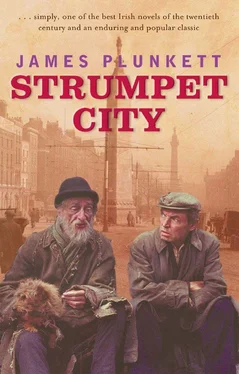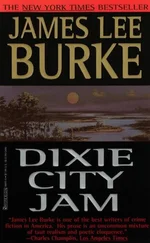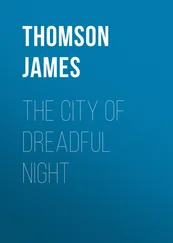‘The night of poor Hanlon’s funeral he showed the two of you the way to the presbytery and on the road out he dropped in to say a few prayers. He met the curate and landed the boilerman’s job. Ten bob a week. Wasn’t that a stroke of good fortune?’
‘It’s only seasonal,’ Joe said.
‘It’ll keep him going through the winter.’
‘Ten bob is a scab rate,’ Pat said, with disgust.
Mary said: ‘The curate is Father O’Connor. I knew him in Kingstown.’
‘Is that a fact?’ Hennessy said, happy to gather a further piece of information.
Pat, with obvious satisfaction, remarked: ‘St. Brigid’s must be a bit of a change for him.’
‘It was his own wish to work here,’ Mary said.
‘Imagine that now.’ Hennessy was greatly impressed.
‘Only a saintly soul would make such a change,’ Mrs. Mulhall said.
‘Every man to his taste,’ Pat said.
Hennessy noted there was full and plenty and lingered. He accepted a second drink and agreed to sing a song. Later he recited a ballad about a young man who gambled away his inheritance and died all alone in the Australian bush, where he was found with a locket in his hand containing a lock of golden hair. Was it his own, a relic of the lost innocence of his childhood or had it been cut from a sweetheart’s golden hair before sin sullied the hopes of youth? Or was it, perhaps, a sweet mother’s tresses, carried to the ends of the earth by an erring son and fondled with remorse when Death laid its chill hand on his brow? The poet was unable to say and Hennessy, having posed the question and moved everybody by the light, nasal style of his recital, let his eye rest on the cup of sugar and suddenly remembered his wife.
‘She’ll think I’m lost,’ he said, springing to his feet.
‘That’s the greatest oddity in Dublin,’ Mulhall remarked.
‘He has the gift, mind you,’ Joe said. The rest had been equally impressed and agreed with him.
Mrs. Mulhall, thinking of the peaky face with its short moustache and small chin, and the far-away look in the eyes during the recital, sighed and said: ‘The poor soul.’
‘I think it’s time we all went,’ Farrell suggested. He had a long walk home before him and a six o’clock start the next morning.
‘That’s a thought,’ Joe said.
They gathered their belongings and began to renew their wishes for happiness and good fortune. They were halfway down the stairs when Mary, who had gone back into the room to tidy up, noticed the parcel in the corner and called to Fitz.
Fitz shouted down the stairs: ‘Pat—your parcel.’
‘Never mind it.’
‘You’ve left it behind you.’
Pat returned a little from the rest and said: It’s for herself—a bit of a wedding present. There’s no need to waken the house over it.’ He was gruff and embarrassed.
‘Did you rob a bank or something?’ Fitz said, smiling.
‘Never mind what I robbed,’ Pat said. He turned and went down to join the rest.
‘Thanks,’ Fitz shouted after him, but he got no reply and went in and closed the door.
Mary was still tidying. Already, he noticed, she had given the room a touch of home.
‘What was ninepence an hour?’ she asked, working busily.
‘I told you about it. The job I called Farrell for.’
‘The night I was asleep and you didn’t waken me?’
Something had happened to him that night that had nothing to do with their love. He remembered the sharp morning wind and, far off, the shouts of the men. Isolated in the top gallery of the house, just before the water pipes rattled into life, he had felt the inward drag of compassion and responsibility, linking him with the others below. Some part of him had become theirs. It was a moment he had no way of explaining to anybody, not even to Mary. He said, ‘It may mean trouble for us.’
‘But it’s so long ago.’
‘So far we’ve been able to keep going at the foundry by drawing from stock. But if the carters don’t deliver to us soon we’ll have to close down. And if non-union men deliver to us we’ll have to refuse to handle the coal.’
‘Maybe they’ll give in and pay them.’
‘That’s what we’re hoping for.’
She had finished her work and was removing her apron. He remembered.
‘The parcel Pat left is a wedding present.’ He took it from the corner and put it on the table. It was heavy. He unwrapped it. It was a marble clock, with the figure of a wolfhound on either side. The gilt on the hands had worn thin in places, but when they wound it and moved the hands it had a low, musical chime.
‘It’s lovely,’ Mary said. They set it on the mantelpiece and stood back to admire it.
It’s a bit on the elegant side for the rest of the room,’ Fitz said.
‘It’s beautiful.’ Her pleasure touched Fitz.
‘That’s two beautiful things to look at every day,’ he said.
‘I’m sure he spent a fortune on it, it’s too much to give.’
‘In a way it’s just as well,’ Fitz said, ‘he’ll have less to act the tin elephant with.’
‘Does he never try to save?’
‘He’d rather give it away.’
‘You have generous friends,’ Mary said. She stood back to look at it once more.
‘Let me hear it chime again,’ she asked.
Fitz moved the hands and the clock responded.
‘It has a happy sound,’ she pronounced.
Fitz took the lamp and they went into the bedroom together. They undressed. Everything had gone well: the ceremony, the breakfast, the afternoon expedition around Howth Head, the customary wedding party. They lay together in the darkness, two lovers in a dilapidated world, knowing each other for the first time. They were near enough to the river to hear, faintly, the siren of a ship. The city grew quiet. Before they slept the clock in the outer room chimed once again.
‘Listen to it,’ Mary whispered.
They listened together. Fitz covered her mouth with his. They forgot the clock and the plaintive siren and the house which was peopled above and below them.
Pat left the rest at Ringsend Bridge and watched them go down past the Catholic church. Its back wall overhung the Dodder. From the bridge he saw the masts of the sailing ships that lay close against the church. They had a derelict look. The water about them gleamed faintly, gathering what light reached it from the few, scattered stars. The stars had a misty look of imminent rain. Under the great hump of the bridge the river, already swollen, moved towards the intricate system of docks and canals which would conduct it deviously to the Liffey and so to the sea. The breeze carried the taint of salt water, a forlorn smell.
As he walked back towards the city the rain began. It was late. The last trams were arriving at Ringsend Depot. They swung into the sheds with a great rattling and clanging, with trolleys that hissed and sparked as they crossed the wire intersections. They left a taste of metal in the street. Machinery vibrated behind the grey walls of Boland’s Mills, and the little, lighted cabin of the overhead telpher made a blurred circle above the foundry yard before it disappeared into the awning of one of the furnace houses. Pat turned into Townsend Street and crossed Butt Bridge. The rain began to seep through his clothes. He had been sharing with Fritz and had neglected to make provision for a bed now that the arrangement had come to an end. But he was contented with drink. He knew what he was going to do.
In the shelter of Amiens Street Bridge he uncorked a bottle of whiskey, drank and went on. The streets were badly surfaced. Already muddy pools were beginning to form. There were lights in occasional windows and once he heard a piano playing
‘For in his bloom
He met his doom
Читать дальше












